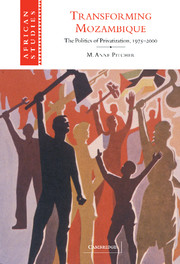Book contents
- Frontmatter
- Contents
- List of figures
- Preface
- List of abbreviations and acronyms
- Glossary
- Map
- Introduction
- 1 The reconfiguration of the interventionist state after independence
- 2 Demiurge ascending: high modernism and the making of Mozambique
- 3 State sector erosion and the turn to the market
- 4 A privatizing state or a statist privatization?
- 5 Continuities and discontinuities in manufacturing
- 6 Capital and countryside after structural adjustment
- 7 The end of Marx and the beginning of the market? Rhetorical efforts to legitimate transformative preservation
- Bibliography
- Index
- OTHER BOOKS IN THE SERIES
2 - Demiurge ascending: high modernism and the making of Mozambique
Published online by Cambridge University Press: 22 September 2009
- Frontmatter
- Contents
- List of figures
- Preface
- List of abbreviations and acronyms
- Glossary
- Map
- Introduction
- 1 The reconfiguration of the interventionist state after independence
- 2 Demiurge ascending: high modernism and the making of Mozambique
- 3 State sector erosion and the turn to the market
- 4 A privatizing state or a statist privatization?
- 5 Continuities and discontinuities in manufacturing
- 6 Capital and countryside after structural adjustment
- 7 The end of Marx and the beginning of the market? Rhetorical efforts to legitimate transformative preservation
- Bibliography
- Index
- OTHER BOOKS IN THE SERIES
Summary
Let us leave for those at the top the intricate charts.
How ingenious are the reports of those state enterprises
happily in deficit either because of drought
or because it said in the newspaper there was too much rain
or because of the sun or because the tractor had lost a screw
or perhaps because the traffic police had not fined Vasco da Gama
for traffic offenses on the Calcutta spice run.
José Cravereinha, “The Tasty ‘Tanjarines’ of Inhambane”It was a misfortune that Mozambique achieved its independence at a time of great economic and political instability, globally as well as regionally. These circumstances increased the risks associated with extensive state intervention into the economy, and intensified the negative political and economic consequences that confronted the regime when state farms, communal villages, and central planning largely failed. But many who try to explain the failure argue that Frelimo might have succeeded were it not for all of these external factors. Alternative explanations swing the pendulum to the other extreme: they argue that the principles and policies of state intervention were deeply flawed and they could never have succeeded regardless of the external factors.
The argument that the project of state intervention collapsed because of external factors usually takes the following form. It concedes that Frelimo's economic policies were not entirely workable nor always socially just in their consequences, but of greater significance was that the environment in which Frelimo launched the policies was unstable and unlucky.
- Type
- Chapter
- Information
- Transforming MozambiqueThe Politics of Privatization, 1975–2000, pp. 67 - 100Publisher: Cambridge University PressPrint publication year: 2002



